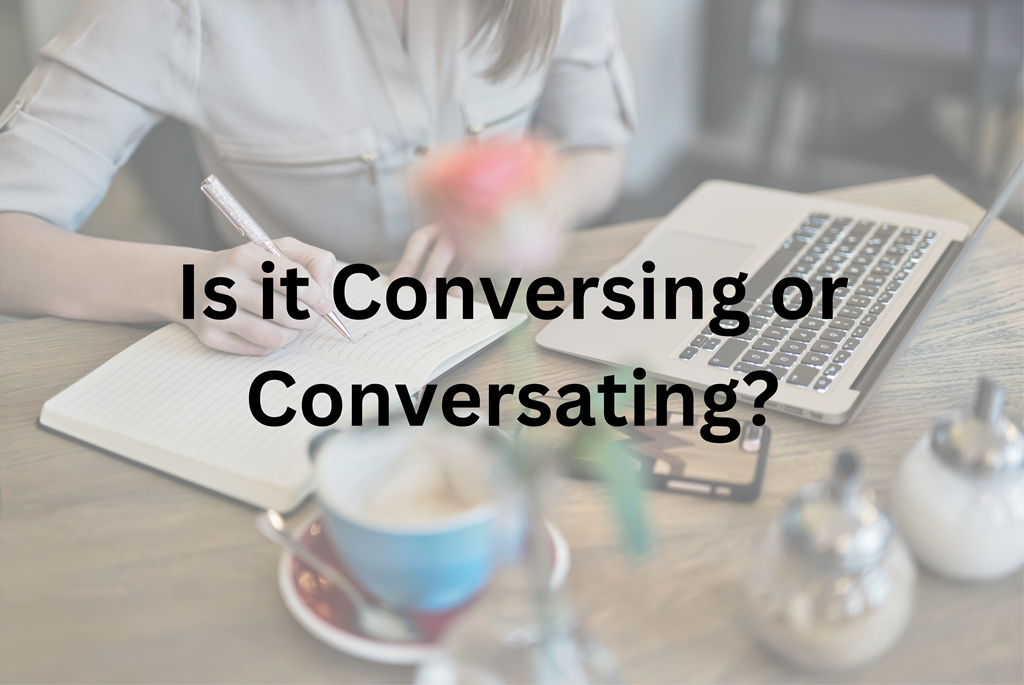People who are avid readers or the ones who love to communicate in native English are often confused about the context of two words, converse and conversate. Both are evidently real words but are often used with a lack of understanding when used for addressing two people in a conversation.
Should you say, “They are conversing.” or “They are conversating.” Now, there is confusion among people to decide what’s right as per the dictionary and grammar to use in situations.
So, let’s dive deeper into trying and understanding the difference between these two words and in what situations they are both justified being used.
Converse vs. Conversate: Let’s Understand the Definition
Here’s a brief explanation of both words to give you an idea of how things are different from one another.
Converse: Speaking With an Informal Tone
The conversation is a noun which originated from the Latin word conversare, which refers to the act of talking or turning about ideas. This word has been used since the 16th century, right after the verb converse came in synonym with the word conversate. It was presumed that converse is the word to be used for addressing people who are talking informally. And the ‘converse’ is a more popular terminology than ‘conversate’ in the field of writing and speaking.
Conversate: A Non-Standard Version of the Word ‘Converse’
Conversate is often used as the verb form of the word conversation. Conversate sounds less formal than that converse. Many people don’t find this word logical and often reject its usage. But it is undeniable that conversate or conversating are still real words. For the first time, the word conversate is said to have been used in the 19th century in a written form.
For better understanding, you should know that conversate is the quasi-version of the word conversation. The process of creating a non-standard version of common words is stated as the process of back-formation. Even though many people preferably use conversate in their talks or texts, it is not much supported. So, when it is about formal writing, try and avoid using the word in your explanations.
When Can the Word ‘Conversate’ or ‘Conversating’ Be Used?
Conversate is a real word, but the use of it in formal speech or writing is scarce. It is mostly seen to be used in text messages or casual conversations. So, here are some case scenarios where ‘conversate’ is an acceptable word:
- When talking with someone close to whom you are quite comfortable, give a casual speech.
- Used in emails or texts while writing something to your family member or friend.
- Writing the dialogues of a fictional character, preferably to justify the slang language.
- Used in song lyrics or poetry.
If you want to sound grammatically correct in your content pieces over the website, eBooks, or other marketing materials, then avoid using conversate in those formal settings. But if you want your audience to connect with you in a more casual manner, then this word might do justice to that thought. But, it isn’t recommended on priority, as the sources categorise it as non-standard, and your knowledgeable audience might adversely point this out.
When Can the Words ‘Converse’ or ‘Conversing’ Be Used?
Converse or Conversing are usually preferable words representing the context of sharing ideas. It is the standard version that is used for conveying the context. There is no restriction on its usage, as you can mention it in almost every communication, whether verbal or written. The areas where conversate or conversating are specified as appropriate can work well with the word converse or conversing as well.
But to differentiate the two words, conversing is mostly preferred in proposals, formal emails, reports, professional documents, academic papers, etc.
Examples to Make You Understand the Difference Between the Context of Using ‘Conversing’ and ‘Conversating’
Here are some examples for you to understand the right usage of conversing and conversating and what kind of tone they replicate:
● I intend to conversate with him sometime about his whereabouts in life.
● He was conversating about Jack at his back.
● They conversated for a long time after they were done with the examination.
Now, these sentences can be framed with the word converse and conversing to replicate the same meaning. It is about your perspective on how you intend to use these words.
The point is, you shouldn’t hate the word conversate because it might be a non-standard form, but so are a few other words such as ain’t, yup, c’mon, etc. But still, you will find some of these words in your favourite novel or conversation texts. So, it is better to decide on what perspective you want to portray while framing a conversation in textual or speech format.
Parting Words
If you are about to send a quick email to your friend or colleague, it’s fine if you are in the habit of using the word conversate or conversating. But, if you were about to use the same in a book or science paper, you prefer using the standardised version, converse, or conversing.
The word ‘conversating’ is grammatically correct, just as ‘conversing’ is, until you are framing the context right. But, ‘conversing’ is the correct version for use in any setting, without any bars. Over time, as people are more inclined towards relating to the informal way of communication through texts, marketing materials, or other content pieces, the word conversating might just pick up pace in the long run.
But till then, stick to the distinguishing factor between formal & informal communication, and use the standard version, ‘conversing’, and the non-standard version, ‘conversating’, accordingly.
Suppose you are running a business and want your website or marketing content to be more specific about grammar rules. In that case, it is high time you understand such differences between standardised and non-standardized versions of the words. If you need help curating your content for a specific set of audiences, WordBeatz is here for your help! Get in touch to learn more!





